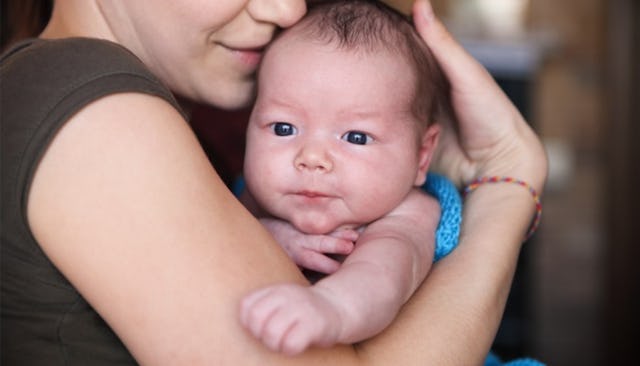Baby Boys Are More Vulnerable To Stress Than Baby Girls, So Don't Hold Back On The TLC

Soon after our first son was born, I remember sorting through the clothes that were gifted to us. As grateful as I was for each and every gift, there were some that I was just unwilling to put on my son. Basically, anything that was explicitly and aggressively gendered had to go.
I’m not talking about the blue clothes, or the cute onesies with trucks or trains on them. I’m talking about the shirts that said things like “Tough guy,” “Ladies Man,” or “Heartbreaker.” The one that said, “Lock Up Your Daughters,” offended me so much I asked my husband to go outside and burn it.
These shirts screamed, “I am a boy. I’m masculine AF even though I only exited the womb three weeks ago.” They went beyond labeling boys “boyish,” but assigned macho and sexually aggressive gender roles — to babies.
Seriously? It’s bad enough that boys are told to be all these things in boyhood and as they mature into men. But it’s disgraceful that it should start as early in life as it does. And it’s not just some stupid words printed on a onesie. It’s how many of us think of our baby boys, even in their early days.
Even if you don’t tell your baby boy to “man up” when he cries, how many times have you heard someone say “boys will be boys” even when talking about a baby? I sure have, unfortunately. Gender stereotypes run deep in our psyche, and even the most enlightened parents treat their babies differently based on whether they were born with penises or vaginas.
Dr. Allan Schore, a clinical psychologist from UCLA, is urging us to stop treating baby boys like little “tough guys.” In his latest paper, “All Our Sons: The Developmental Neurobiology and Neuroendocrinology of Boys at Risk,” which appears in the Infant Mental Health Journal, Dr. Schore explains that baby boys actually are more vulnerable than we might think, and may in fact need more coddling and TLC than baby girls.
Dr. Schore says that there are actually major differences between male and female brain development, even in the earliest stages of life, specifically that the right brain area of baby boys develops at a slower rate than baby girls. Additionally, baby boys have less self-regulating stress hormones than baby girls (even in utero), so they are more vulnerable to the effects of environmental, physical, and social stressors.
Girls, on the other hand, seem to be born with more resilience to these stressors (though I don’t think anyone needed to tell us girls that we are tough as nails!).
In all seriousness, though, Dr. Schore believes that these vulnerabilities in baby boys are what make them more susceptible to neuropsychiatric disorders that appear early in life like autism, early onset schizophrenia, and attention deficit disorder (girls seem to be more vulnerable to the disorders that appear later in life). Dr. Schore points out that baby boys are also more likely to show frustration than baby girls at 6 months old, and at 12 months, baby boys show more intense reactions to negative stimuli.
So what’s his answer to how we can protect boys in what is perhaps their most vulnerable state in life? He advises parents to be extra responsive to their baby boy’s needs, and be unafraid of showing affection or attachment. “In light of the male infant’s slower brain maturation,” says Dr. Schore, “the secure mother’s attachment-regulating function as a sensitively responsive, interactive affect regulator of his immature right brain in the first year is essential to optimal male socioemotional development.”
Of course, none of this is to say that we should give any less TLC to our girl babies just because they’re usually born with all that built-in resiliency, but simply that we shouldn’t buy into all those gender stereotypes slapped onto boys from the moment they are born. We shouldn’t expect them to “toughen up” — and by God, we shouldn’t respond to them any less quickly, or with any less compassion when they cry or fuss.
Really, as far as I’m concerned, this should be a no-brainer — I mean, they’re freaking babies. I personally can’t understand why anyone would respond to a crying baby (boy or girl) with anything less than a warm, fuzzy hug. But gender stereotypes truly do run deep, and I think there are subtle things we each do differently with our girl and boy babies, so research like this is a good reminder to stay aware of these sorts of things.
So cuddle your sweet-as-pie baby boy as much as you damn well please. Pick him up when he cries. Cover him from head to toe with kisses. And never tell him to “man up” or “boys don’t cry” or any other absurd thing no one should ever actually say to a baby. Everyone will be better off because of it.
This article was originally published on